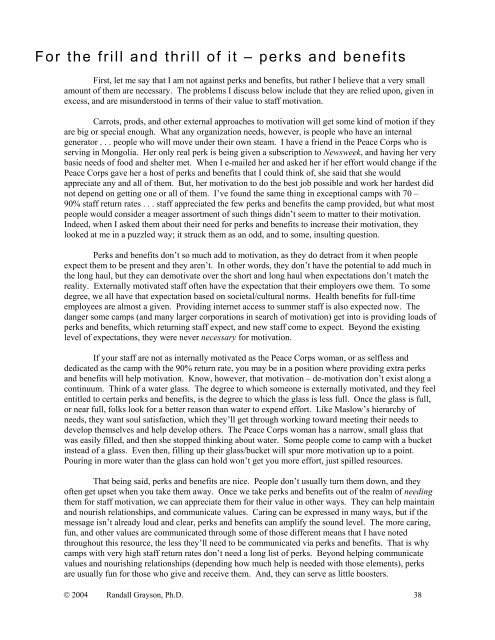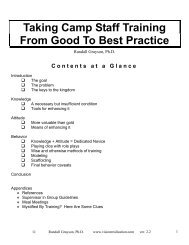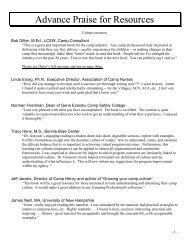Staff motivation - Vision Realization
Staff motivation - Vision Realization
Staff motivation - Vision Realization
You also want an ePaper? Increase the reach of your titles
YUMPU automatically turns print PDFs into web optimized ePapers that Google loves.
For the frill and thrill of it – perks and benefits<br />
First, let me say that I am not against perks and benefits, but rather I believe that a very small<br />
amount of them are necessary. The problems I discuss below include that they are relied upon, given in<br />
excess, and are misunderstood in terms of their value to staff <strong>motivation</strong>.<br />
Carrots, prods, and other external approaches to <strong>motivation</strong> will get some kind of motion if they<br />
are big or special enough. What any organization needs, however, is people who have an internal<br />
generator . . . people who will move under their own steam. I have a friend in the Peace Corps who is<br />
serving in Mongolia. Her only real perk is being given a subscription to Newsweek, and having her very<br />
basic needs of food and shelter met. When I e-mailed her and asked her if her effort would change if the<br />
Peace Corps gave her a host of perks and benefits that I could think of, she said that she would<br />
appreciate any and all of them. But, her <strong>motivation</strong> to do the best job possible and work her hardest did<br />
not depend on getting one or all of them. I’ve found the same thing in exceptional camps with 70 –<br />
90% staff return rates . . . staff appreciated the few perks and benefits the camp provided, but what most<br />
people would consider a meager assortment of such things didn’t seem to matter to their <strong>motivation</strong>.<br />
Indeed, when I asked them about their need for perks and benefits to increase their <strong>motivation</strong>, they<br />
looked at me in a puzzled way; it struck them as an odd, and to some, insulting question.<br />
Perks and benefits don’t so much add to <strong>motivation</strong>, as they do detract from it when people<br />
expect them to be present and they aren’t. In other words, they don’t have the potential to add much in<br />
the long haul, but they can demotivate over the short and long haul when expectations don’t match the<br />
reality. Externally motivated staff often have the expectation that their employers owe them. To some<br />
degree, we all have that expectation based on societal/cultural norms. Health benefits for full-time<br />
employees are almost a given. Providing internet access to summer staff is also expected now. The<br />
danger some camps (and many larger corporations in search of <strong>motivation</strong>) get into is providing loads of<br />
perks and benefits, which returning staff expect, and new staff come to expect. Beyond the existing<br />
level of expectations, they were never necessary for <strong>motivation</strong>.<br />
If your staff are not as internally motivated as the Peace Corps woman, or as selfless and<br />
dedicated as the camp with the 90% return rate, you may be in a position where providing extra perks<br />
and benefits will help <strong>motivation</strong>. Know, however, that <strong>motivation</strong> – de-<strong>motivation</strong> don’t exist along a<br />
continuum. Think of a water glass. The degree to which someone is externally motivated, and they feel<br />
entitled to certain perks and benefits, is the degree to which the glass is less full. Once the glass is full,<br />
or near full, folks look for a better reason than water to expend effort. Like Maslow’s hierarchy of<br />
needs, they want soul satisfaction, which they’ll get through working toward meeting their needs to<br />
develop themselves and help develop others. The Peace Corps woman has a narrow, small glass that<br />
was easily filled, and then she stopped thinking about water. Some people come to camp with a bucket<br />
instead of a glass. Even then, filling up their glass/bucket will spur more <strong>motivation</strong> up to a point.<br />
Pouring in more water than the glass can hold won’t get you more effort, just spilled resources.<br />
That being said, perks and benefits are nice. People don’t usually turn them down, and they<br />
often get upset when you take them away. Once we take perks and benefits out of the realm of needing<br />
them for staff <strong>motivation</strong>, we can appreciate them for their value in other ways. They can help maintain<br />
and nourish relationships, and communicate values. Caring can be expressed in many ways, but if the<br />
message isn’t already loud and clear, perks and benefits can amplify the sound level. The more caring,<br />
fun, and other values are communicated through some of those different means that I have noted<br />
throughout this resource, the less they’ll need to be communicated via perks and benefits. That is why<br />
camps with very high staff return rates don’t need a long list of perks. Beyond helping communicate<br />
values and nourishing relationships (depending how much help is needed with those elements), perks<br />
are usually fun for those who give and receive them. And, they can serve as little boosters.<br />
© 2004 Randall Grayson, Ph.D. 38





